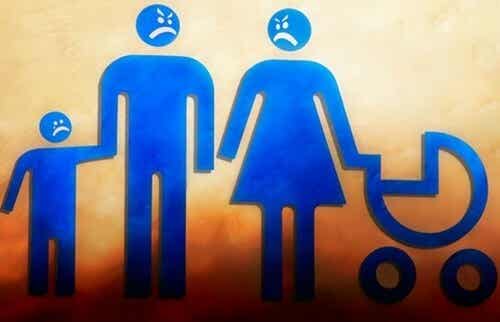
Last update: 14 September, 2022
La disabling family it deactivates the personal development of its members through a series of mechanisms that end up causing insecurity. In fact, it undermines the trust of members in their abilities and generates a feeling of inferiority that hinders their personal growth.
We all know that the family is the fundamental social nucleus. Thanks to it we learn to relate to other human beings. Primarily, we learn the models that this nucleus transmits to us, which serve us as a basis for relating in other contexts. But what if ours is a disabling family?
A disabling family conveys wrong patterns of behavior. These are attitudes characterized by anxiety and guilt. Parents thus cancel the development of their children, who are hardly able to adapt to other environments; therefore it is common for them to stay at their parents' home until old age.
The disabling family and overprotection
One of the most common mechanisms within the disabling family is overprotection. That is, they try to protect their children too much from any potential danger. We start from the idea that the world is a place full of threats. Following this, preventive and protective measures must be taken to avoid falling victim to it.
This educational style is based on anxiety, addiction and low self-esteem. Anxiety creates imaginary fears and guilt. Parents want their children to "not suffer" and are afraid of hurting them by giving them responsibilities. This way of doing, however, does not make children happier, quite the opposite. It is the quintessence of the invalidating family.
People who "grow up" in such a family do so with a backpack on their shoulders that gradually fills with fears. Just leaving the house scares them. The worst thing is that they fail to identify the means they have at their disposal to face difficulties or to achieve their goals. For this there are parents. They know everything.
Extreme addiction and superiority
The disabling family over-protects because it is driven by anxiety. However, at the same time it launches an implicit message of superiority: “I can do it, you can't. The family can protect you, you cannot do it alone ”. In this way, it generates strong bonds of addiction and, consequently, a very low self-esteem.
For this reason, they prolong the dependence of their children as much as possible. It is one of the mechanisms most used by a disabling family, because in this way, the children will have a lot of difficulty in getting out of the nest, and it is not certain that they will succeed. They will need family to do almost everything.
A vicious circle that traps
It is not easy to get out of the vicious circle created by a disabling family. And it's not easy, in the first place, why people hardly want to admit that their family background is pathological. There is an idea of the family that it does everything for the good of the children and that the children end up believing that it is true. Many sacrifices, many cares. It is difficult to understand that, in reality, all this corresponds to a pathological model and not to a precious love.
People in a disabling family are usually very insecure and wary. Has a low frustration tolerance and for this reason it is extremely difficult for him to set goals and achieve them, due to the various difficulties he encounters. In general, the person feels inferior to others and often victimizes himself. This is because she is used to feeling worthy of special consideration.
The only way out of the vicious circle of the crippling family is unlearn the educational models learned, certainly not an easy undertaking. The individual must abandon a structure created by the people he loves most and in which he has the feeling of being well. The idea of facing his fears without the support of this protective environment is terrifying to him, an act of ingratitude towards those who protect him and a way of taking unnecessary risks.
He no longer counts on family support and has to look for it in a new figure, such as a therapist or a stranger who can compensate for his lack of trust. In these cases, therefore, asking for help is the first and most important step.


























